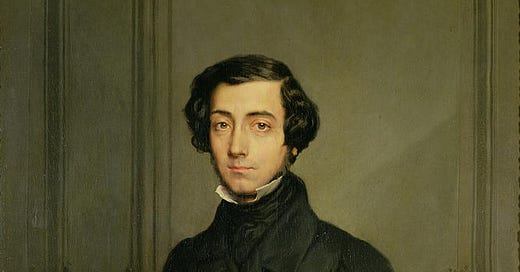Who was Alexis de Tocqueville?
During the 1800s, Alexis de Tocqueville was a French sociologist, historian, and political theorist. In Paris, France, on July 29, 1805, he was born into an aristocratic family. The book that has brought Tocqueville the greatest notoriety is "Democracy in America" (1835; updated in 1840), which is today recognized as one of the foundational works in political philosophy and social science. Following his legal studies, Tocqueville became a magistrate in the French court system. But soon after, he developed an interest in politics, and he went to the US in 1831 with his friend Gustave de Beaumont. Although studying the American criminal justice system was their main goal, Tocqueville also wrote extensively about the country's political system, society, and culture as a result of his travels and observations.
"Democracy in America" is Tocqueville's best-known work. He focused on the US while examining the social and political implications of democracy there. Tocqueville was interested in American democracy, the role of civil society, the impact it had on individual liberty, and the potential negative effects of majority rule. His evaluations of the advantages and disadvantages of democratic governance are still highly influential. Tocqueville's analysis of the causes and consequences of the French Revolution in "The Old Regime and the Revolution" (1856) and his other writings on political philosophy and history are among his other notable works. Tocqueville died on April 16, 1859. Political philosophy and social analysis are still studied and respected today because of the great legacy he left behind. His books have been extremely helpful to the fields of political science, sociology, and history, and he is acknowledged as one of the most insightful observers of democracy and its issues.
Democracy in America
Alexis de Tocqueville wrote "Democracy in America" in the 1830s following his visit to the United States. Imagine visiting America with a companion while on a road trip, seeing its villages and cities and getting to know its people. Tocqueville accomplished essentially the same thing, although he was particularly fascinated in the functioning of American society and government. By "democracy," of course, Tocqueville meant more than just elections and voting. He was interested in society as a whole—in how people worked, lived, and came to conclusions. In contrast to Europe, where he was born, he saw that people in America appeared to have greater freedom and independence.
One concept that Tocqueville discussed extensively was "equality of conditions." That is another way of stating that people felt more equal in America. He reasoned that this was due to the lack of a rigid class structure, unlike in Europe. In America, one's ability to succeed in society was determined by their own efforts and not only by their family's status. Another area of great concern for Tocqueville was the way in which Americans established "associations." These were social groupings that got together for a variety of purposes, such as clubs, churches, or volunteer organizations. Because they taught individuals how to collaborate and find solutions to issues without constantly depending on the government, he believed that these associations were extremely significant.
However, everything wasn't sunshine and rainbows. Tocqueville expressed concern on the "tyranny of the majority." That is the moment when the vast majority of members of a society make choices that may not be equitable for all. He believed that if the majority constantly gets its way, it may eventually infringe on the rights of minority, which could be problematic in democracies. He proposed some solutions to the problem of tyranny.
What can be done to help the "tyranny of the majority" problem?
Tocqueville thought that powerful institutions may serve as a check on the power of the majority, such as an independent court. Societies can stop the tyranny of the majority from encroaching on individual liberties by making sure that there are procedures in place to defend the rights of minorities and enforce the rule of law. Tocqueville placed a strong emphasis on the creation of voluntary societies and engaged citizenship. He felt that citizens acquire a sense of accountability and care for the common good when they participate actively in civil society. By encouraging cooperation and collaboration among various groups, these associations act as a counterbalance to the authority of the majority.
Tocqueville maintained that in order to keep tyranny in check in democracies, there must be a sincere commitment to upholding individual rights and liberties. He underlined how crucial it is to defend fundamental rights—like the freedom of expression, of religion, and of assembly—even when the majority may not agree with them. Tocqueville emphasized the importance of having a strong political culture that respects diversity, tolerance, and cooperation. He thought that the majority could not force its will on minority groups if citizens were encouraged to cultivate a culture of mutual tolerance and understanding. Tocqueville emphasized the importance of education in promoting civic engagement and knowledge. He thought that a well-informed public is better able to assess political matters critically, fend against demagoguery, and defend democratic values.
Alex de Tocqueville's views on freedom, democracy, and the value of civil society are still discussed and researched today. He is, in a sense, a historical figure who had some pretty intriguing ideas about how societies function and how nations are governed.




